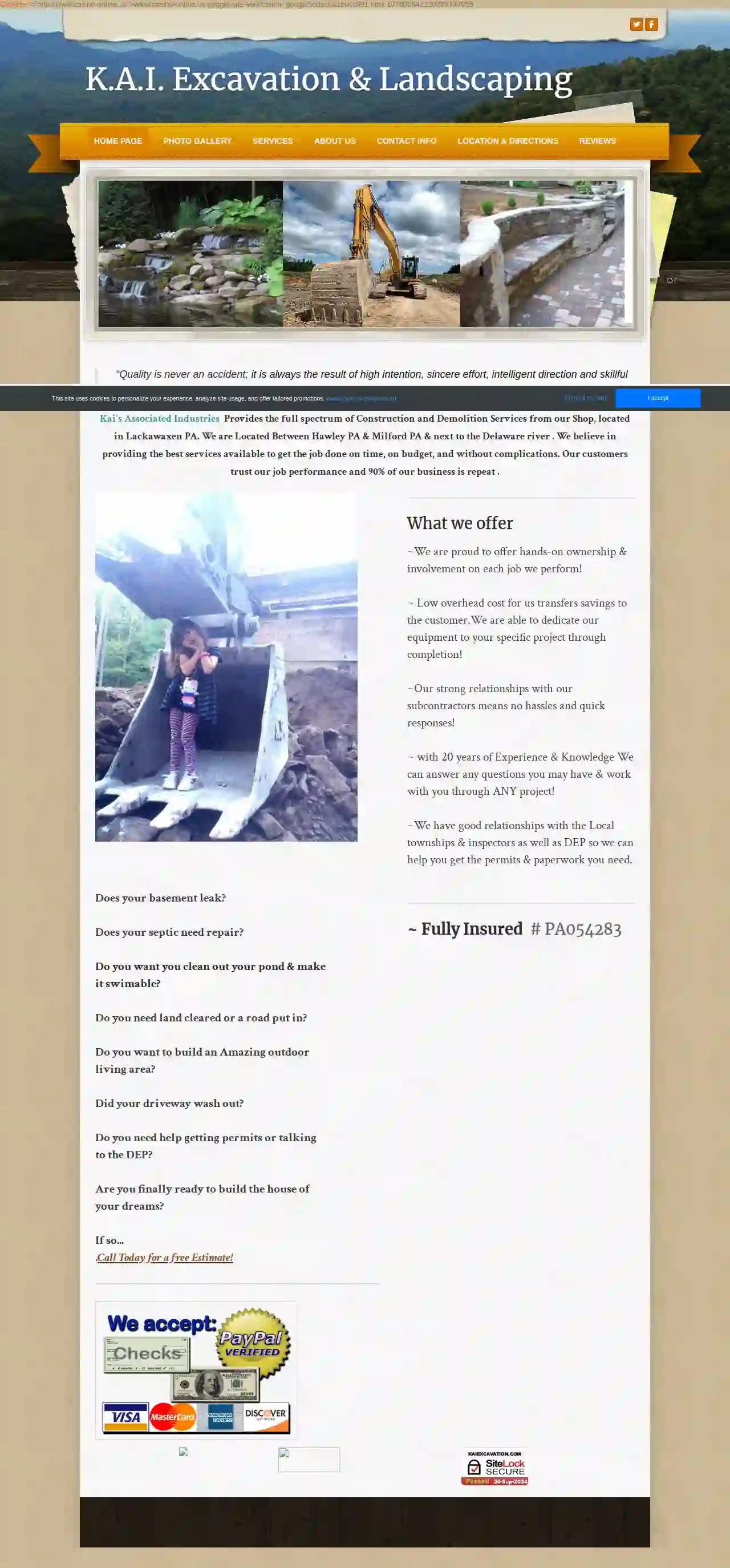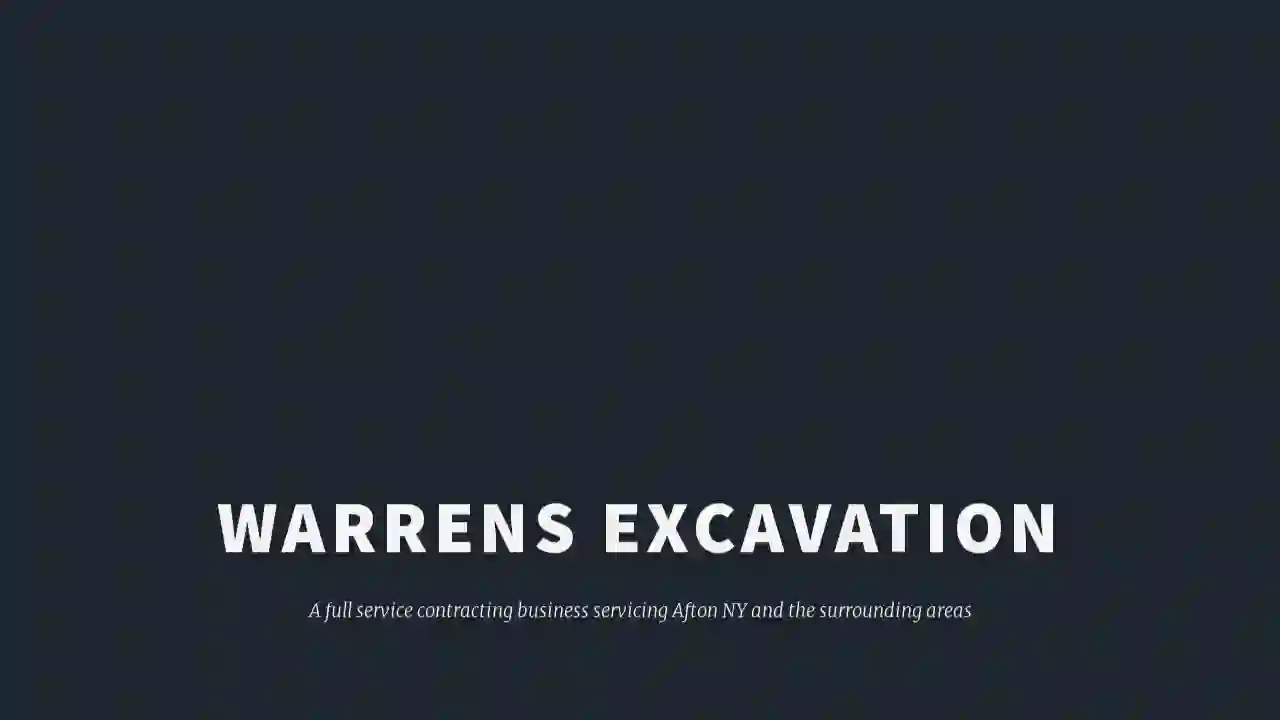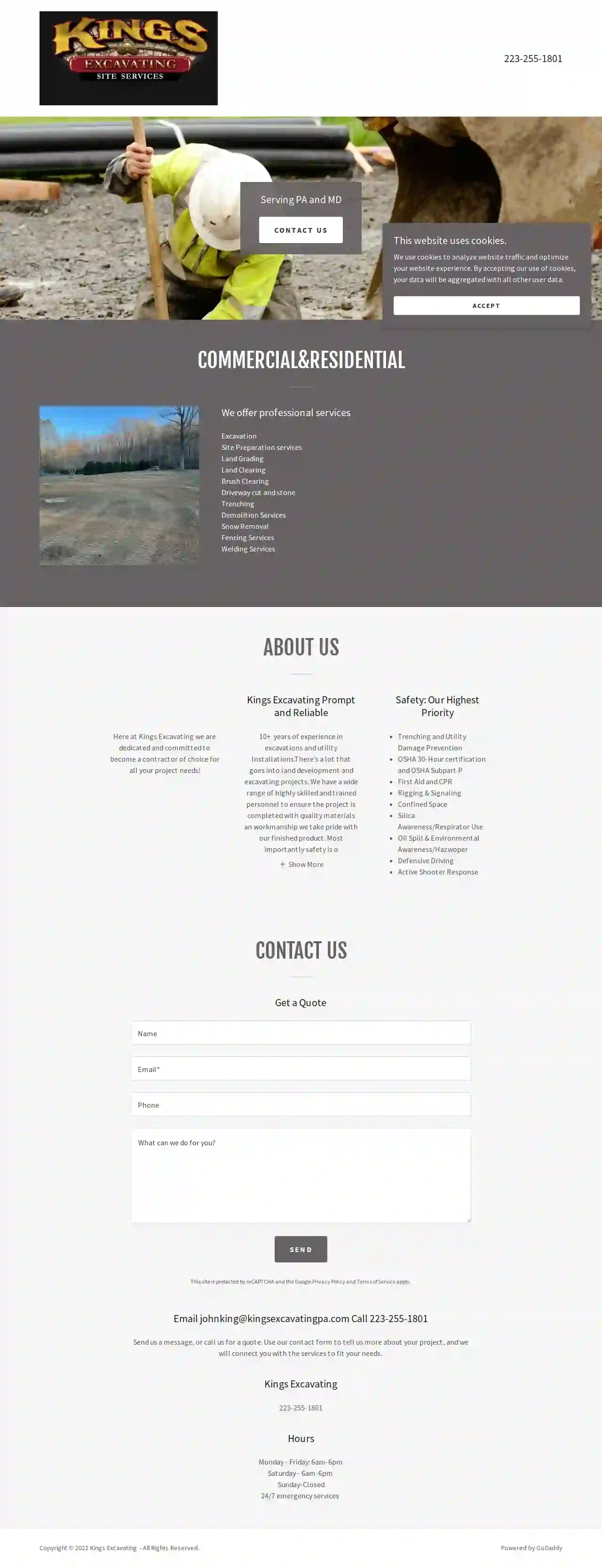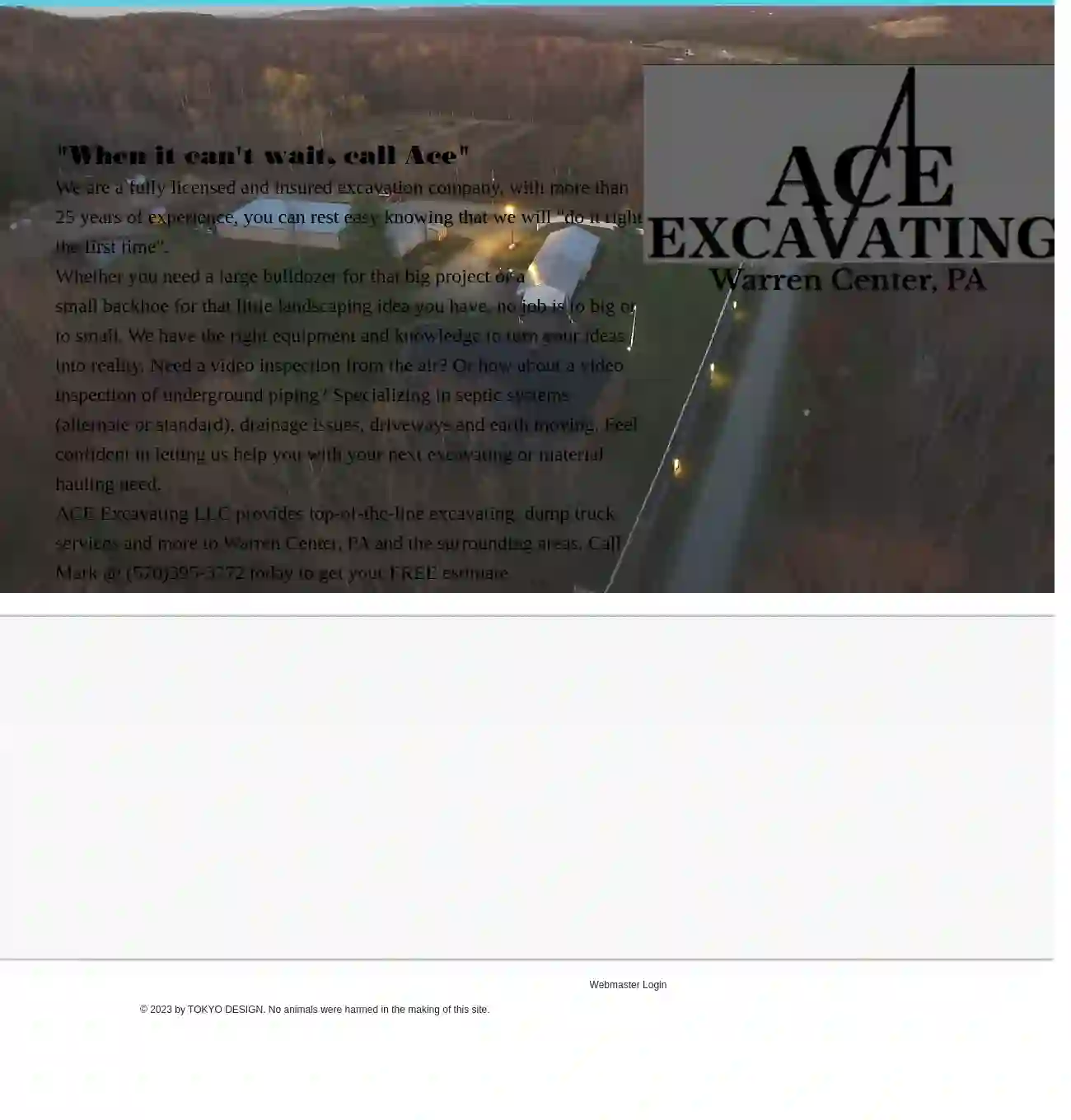Excavation Contractors Foster
Find the best Excavation Contractors Near Me in Foster
Receive up to 3 Trenching Services quotes for your project today! Compare profiles, reviews, accreditations, portfolio, etc... and choose the best deal.

K.A.I. Excavation & Landscaping
4.423 reviewsLackawaxen, USAbout Kai Wicksnes /Owner Operator When did you start your business? I started working in the landscaping /Excavation field right out of High School in 1995. I worked with Heavy Equipment since I was old enough to reach the lever's & Petals. My Best Friend Growing up had a Father in the Excavation business and I learned a lot from him at a very young age. I also came from a long line of hard working men with good work ethics. My dad taught me that learning new trades and learning about the Land was crucial to being a well rounded man. I had a natural proclivity and passion for Excavating & Landscaping since I was a young boy. Before I had my drivers licence neighbors would see me driving my bike with a cart behind it carrying a lawn mower, gas & a rake in tow. Soon I had a small business in the neighborhood and it has grown into what it is today. I have always loved seeing the end result of my work. It gives me great pride to take an area so rough & tumble & make a beautiful waterfall with a pond with free land to run on. What makes you different than other similar businesses in your community? I live in the area that I work ,so I do the best work possible to keep my clients(who are usually my neighbors) happy. I like to drive past a job I did and see kids running in the lawn I created or people sitting around a stone fireplace I built. It is very important to me to continue building a top notch business for my children to someday run. I want Kai's Associated Industries to be known for our great customer service & excellent work. I also have a lot of my own land so I get the majority of my materials right from my property. I am able to REUSE a lot of resources such as tree stumps which we bury until they biodegrade back into the soil. Being very cautious with any land & it's animals, I consider all option's while clearing a large portion of forest. We are a small family business with a big presence With over 20 years of experience & am very knowledgeable about what I do. I am now building a family who is also into landscaping & excavating. From creating landscapes, to operating machinery, to advertising, and book work. I am looking forward to my children working with me & continuing the well established business I poured my heart and soul into. I am a firm Believer that a Family that works together, Stays together . I look forward to see
- Services
- Why Us?
- Gallery
Get Quote
CAG Construction Corp.
30 Summit Ave., Staten Island, 10306, USCAG Construction: Your Trusted Partner for Concrete Construction and Site Work CAG Construction is a family-run business established in 2007, specializing in all phases of concrete construction and site work. We are committed to delivering projects within budget, on time, and with the utmost professionalism. Our team has the experience and expertise to work seamlessly with project managers and design teams, ensuring a smooth construction process. Our Commitment to Excellence Edward Gonzalez, our founder, is a graduate of the NYC Small Business Services Construction Mentorship Program, NYC SBS Bond Readiness Program, and the New York City Economic Development Corporation – Construct NYC Program. This comprehensive training has equipped us with the knowledge and skills to deliver exceptional results. Certifications and Accreditations We are proud to be a New York City MBE Certified company, demonstrating our commitment to diversity and inclusion. We are also SCA Approved and a member of the National Association of Minority Contractors (NAMC), further solidifying our dedication to industry standards and ethical practices.
- Services
- Why Us?
- Gallery
Get Quote
Kirby Kitner Excavating & Paving
4.86 reviews7214 Spring Road, New Bloomfield, USWelcome to Kirby Kitner Excavating! Whether it is site prep for new structures, foundations, road building, graves sites, drainage or septic systems, Kirby consults with all customers personally and is present on all job sites to assure you of quality workmanship. Our staff is professional, experienced, and dependable. We are celebrating our 39th year in business. Kirby Kitner Excavating is a local, family-owned business. Our company is fully insured and we give free estimates. Kirby Kitner Excavating is a DOT Registered Motor Carrier: USDOT 2291670 and a Registered PA Contractor: # PA027056. We are members of the Perry County Chamber of Commerce. Kirby Kitner Excavating is located at 7214 Spring Road, New Bloomfield, PA.
- Services
- Why Us?
- Gallery
Get Quote
Winola Excavating
57 reviews64 Benson Hollow Ln, Tunkhannock, 18657, USWinola Excavating – Delivering quality service and expert craftsmanship for all your construction and excavation needs. We are a full-service local contractor specializing in residential, commercial and industrial excavation and construction services. Our clients include homeowners, business owners, landlords, real estate agents, builders, contractors and developers. What sets us apart? Typically, we are able to provide same day estimates and will show up on time prepared to deliver exceptional service to you. In fact, we have limited to no rescheduling (dependant on weather), price our jobs fairly and get them done in a timely fashion. Your satisfaction is our number one goal. And with 10 years of customer service management experience, we know how to deliver.
- Services
- Why Us?
- Gallery
Get Quote
Superior Earth Works, LLC
51 reviewsBel Air, Maryland, USIntroducing Superior Earth Works, LLC Transforming project visions into reality is our specialty at Superior Earth Works. Based in Bel Air, MD, we dedicate ourselves to providing top-quality excavation and concrete services for residential and commercial clients. Our goal is to achieve excellence in every project. By understanding our clients' needs and delivering beyond their expectations, we ensure that each project stands as a testament to superior craftsmanship and dedication. We believe that quality workmanship is the cornerstone of our business, and we strive to maintain the highest standards in every project, along with timely delivery and reasonable prices. As an experienced excavation contractor, we specialize in site clearing, ensuring that your land is ready for any new construction. Our demolition services are efficient and thorough, making way for new possibilities. With our bobcat services, we handle everything from land grading to site preparation with precision and care. Our expertise includes shoring services, providing the necessary support to safeguard your construction projects. Whether you require land demolition, grading, regrading, or resloping services, we have the skills and equipment to execute the job to perfection. We deliver impeccable building site preparation and construction site preparation. In addition to our excavation capabilities, we offer a full suite of concrete services. From driveways to patios, we deliver concrete work that enhances the utility and visual appeal of your property. Our concrete services are designed to withstand the test of time, providing durable and attractive surfaces that you can rely on. Choosing Superior Earth Works means choosing an excavation partner who values your project and strives to achieve superior results. Experience the difference that our dedication to excellence can make -- contact us today to discuss your excavation needs. Superior Earth Works in Bel Air, MD, is here to provide you with the superior service you deserve.
- Services
- Why Us?
- Gallery
Get Quote
Skiles Excavating, Inc.
46 reviews71 Smith Road, Newville, 17241, USSkiles Excavating: A Legacy of Precision and Community Skiles Excavating began its journey like many other successful excavating companies—with a single individual, James Skiles, who brought with him over 20 years of equipment operating experience, a backhoe, and an ambitious dream. In 2006, he created a business that would not only shape a better life for his family but also excel in the excavation industry. Since then, we’ve made significant strides, building strong relationships with electrical contractors while undertaking excavating projects for underground utilities and concrete work. Our services quickly expanded to include plumbing excavation and small site projects, enabling us to diversify our expertise. In 2018, we achieved the milestone of incorporation in Pennsylvania and are now proud to have a dedicated team of over 30 skilled employees. Our commitment to excellence and solid partnerships with contractors are the cornerstones of our success. One of our core values at Skiles Excavating is "Giving Back to the Community"— 1st Annual Shippensburg Pumpkin Festival
- Services
- Why Us?
- Gallery
Get Quote
Warren's Excavation & Stone
51 reviews10000 10th Line, Tavistock, N0L 1P0, USWarren's Excavating: Your Trusted Partner for Excavation Services Warren's Excavating is a family-owned and operated business with over 20 years of experience in the excavation industry. We are committed to providing our clients with high-quality, reliable, and affordable services. Our team of experienced professionals is dedicated to exceeding your expectations and delivering exceptional results. We understand that every project is unique, and we take the time to listen to your needs and develop a customized plan that meets your specific requirements. Whether you're looking for site preparation, foundation excavation, utility installation, or any other excavation service, we have the expertise and equipment to get the job done right. At Warren's Excavating, we pride ourselves on our commitment to safety, quality, and customer satisfaction. We use only the latest equipment and techniques to ensure that your project is completed on time and within budget. We also offer free estimates and competitive pricing. Contact us today to learn more about our services and how we can help you with your next excavation project.
- Services
- Why Us?
Get Quote
Kings Excavating
Pittsburgh, USKings Excavating: Prompt and Reliable Here at Kings Excavating, we are dedicated and committed to becoming your contractor of choice for all your project needs! With over 10 years of experience in excavations and utility installations, we have a wide range of highly skilled and trained personnel to ensure your project is completed with quality materials and workmanship. We take pride in our finished product, and most importantly, safety is our number one priority. We strive to create a safe working environment for our employees and the public throughout every project. Safety: Our Highest Priority We prioritize safety in all our operations, adhering to the highest industry standards. Our team is equipped with the necessary certifications and training to ensure a safe and efficient work environment. Our commitment to safety includes: Trenching and Utility Damage Prevention OSHA 30-Hour certification and OSHA Subpart P First Aid and CPR Rigging & Signaling Confined Space Silica Awareness/Respirator Use Oil Spill & Environmental Awareness/Hazwoper Defensive Driving Active Shooter Response
- Services
- Why Us?
- Gallery
Get Quote
Ace Excavating
52 reviewsWarren Center, USWhen it can't wait, call Ace We are a fully licensed and insured excavation company, with more than 25 years of experience, you can rest easy knowing that we will "do it right the first time". Whether you need a large bulldozer for that big project or a small backhoe for that little landscaping idea you have, no job is to big or to small. We have the right equipment and knowledge to turn your ideas into reality. Need a video inspection from the air? Or how about a video inspection of underground piping? Specializing in septic systems (alternate or standard), drainage issues, driveways and earth moving. Feel confident in letting us help you with your next excavating or material hauling need.
- Services
- Why Us?
- Gallery
Get Quote
Fischer Brothers Excavating
519 reviews712 Drinker Turnpike, Covington Twp, 18424, USWelcome to Fischer Brothers Excavating, a small company providing residential and commercial heavy equipment services to Moscow PA and surrounding areas since 2004. Robert and Jeff, both graduates of North Pocono High School, take great pride in serving their community. We are a family-owned business, and all of our work is performed by owners Robert and Jeff. We make our best efforts to answer every phone call, and most calls are returned the same day. If you have a job that requires excavation services, we will take the time to discuss your project with you to determine if we are able to help. If we are able to help, we will give you an estimated cost for your work. We offer a wide range of services, including delivery, excavating, drainage, septic systems, basement water proofing, foundation repair, utilities, grading, snow removal, and specialty services. We are licensed, certified, and insured, and we provide excavation services to areas within a 30-mile radius of Moscow, Pennsylvania.
- Services
- Why Us?
- Our Team
- Gallery
Get Quote
Over 22,076+ Excavation Businesses in our network
Our excavation contractors operate in Foster and beyond!
ExcavationHQ has curated and vetted the Best Excavation Businesses in Foster. Find a top & trustworthy business today.
Frequently Asked Questions About Excavation Contractors
- Topsoil Removal: Stripping the fertile topsoil layer from a site, often preserving it for landscaping.
- Trench Excavation: Digging long, narrow trenches for utilities (pipes, cables) or foundations.
- Basement Excavation: Removing earth to create a space for a basement beneath a structure.
- Pool Excavation: Digging a precise hole for installing a swimming pool.
- Roadway Excavation: Removing earth and preparing the ground for road construction.
- Demolition Excavation: Clearing debris and preparing the site after demolition.
- Channel Excavation: Creating channels for drainage or irrigation.
- Hauling to Designated Disposal Sites: Transporting excavated material to approved landfills or recycling centers.
- Recycling or Reuse: If suitable, some excavated soil might be recycled for other projects or reused on-site for landscaping or backfilling.
- Complying with Regulations: Adhering to local and environmental regulations for soil disposal to prevent contamination or illegal dumping.
- Excavations Deeper Than a Certain Depth: This varies by jurisdiction, usually around 5 feet.
- Excavations Near Utilities: Digging near buried utilities (gas, water, electric) often requires permits and utility locates to prevent damage.
- Excavations Affecting Public Property: Projects impacting sidewalks, roads, or other public areas typically require permits.
- Excavations in Environmentally Sensitive Areas: Projects in wetlands, floodplains, or other sensitive areas might need special permits.
What are the different types of excavation?
How do you handle soil disposal after excavation?
What is the difference between excavation and grading?
Excavation: Primarily involves removing earth or other materials from a site. It's about digging down and creating space.
Grading: Focuses on shaping and leveling the ground to a specific slope or elevation. It's about adjusting the existing terrain.
For example, you might excavate a foundation and then grade the surrounding area to ensure proper drainage and a level surface for landscaping.
Do I need a permit for excavation?
What are the different types of excavation?
- Topsoil Removal: Stripping the fertile topsoil layer from a site, often preserving it for landscaping.
- Trench Excavation: Digging long, narrow trenches for utilities (pipes, cables) or foundations.
- Basement Excavation: Removing earth to create a space for a basement beneath a structure.
- Pool Excavation: Digging a precise hole for installing a swimming pool.
- Roadway Excavation: Removing earth and preparing the ground for road construction.
- Demolition Excavation: Clearing debris and preparing the site after demolition.
- Channel Excavation: Creating channels for drainage or irrigation.
How do you handle soil disposal after excavation?
- Hauling to Designated Disposal Sites: Transporting excavated material to approved landfills or recycling centers.
- Recycling or Reuse: If suitable, some excavated soil might be recycled for other projects or reused on-site for landscaping or backfilling.
- Complying with Regulations: Adhering to local and environmental regulations for soil disposal to prevent contamination or illegal dumping.
What is the difference between excavation and grading?
Excavation: Primarily involves removing earth or other materials from a site. It's about digging down and creating space.
Grading: Focuses on shaping and leveling the ground to a specific slope or elevation. It's about adjusting the existing terrain.
For example, you might excavate a foundation and then grade the surrounding area to ensure proper drainage and a level surface for landscaping.
Do I need a permit for excavation?
- Excavations Deeper Than a Certain Depth: This varies by jurisdiction, usually around 5 feet.
- Excavations Near Utilities: Digging near buried utilities (gas, water, electric) often requires permits and utility locates to prevent damage.
- Excavations Affecting Public Property: Projects impacting sidewalks, roads, or other public areas typically require permits.
- Excavations in Environmentally Sensitive Areas: Projects in wetlands, floodplains, or other sensitive areas might need special permits.